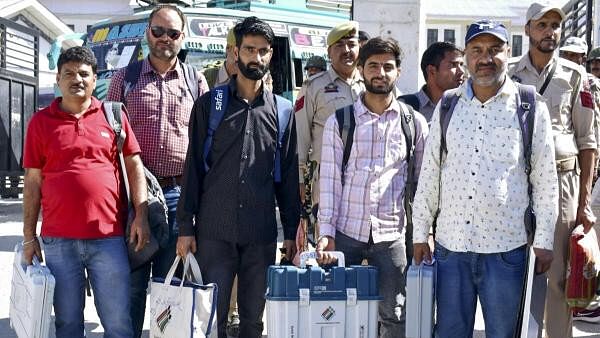
Polling officials leave for their respective polling stations on the eve of first phase of the Jammu and Kashmir Assembly election, in Kishtwar district.
Credit: PTI Photo
Srinagar: As high pitch campaigning for the first phase of assembly elections concluded in Jammu and Kashmir, large turnout is expected on 24 out of 90 seats which will go for polls on Wednesday.
The Assembly elections, the first in a decade, follow the significant constitutional changes of August 2019 when New Delhi revoked J&K’s special status under Article 370 and downgraded the state into two Union Territories.
The ballot will allow residents to have their own elected government and an assembly, instead of remaining under central rule. For weeks, the atmosphere had been charged with the fervor of political rallies and the cacophony of promises from various parties and candidates.
Streets were festooned with banners, flags, and posters, with each candidate vying for voter attention and support. As the election date approached, the intensity of the campaigns escalated, with Prime Minister Narendra Modi, Home Minister Amit Shah, and Congress leader Rahul Gandhi making final appeals to the electorate.
Even some separatist leaders, who had previously deemed the elections illegitimate, are running as independent candidates. Many locals viewed this election not only as a chance to elect their representatives but also as a means to protest the 2019 constitutional changes.
“We need relief from bureaucratic rule,” said Arif Ahmad, a shopkeeper. “Through our vote, we want to express our dissent against the BJP government’s undemocratic decision.”
Shabeena, a housewife, echoed similar sentiments. “No one in our family has voted in the past 30 years, but this time, we are all voting to protest what New Delhi did by stripping Kashmiris of their constitutional rights.”
The Congress party, promising to restore J&K’s statehood, has allied with the regional National Conference (NC), positioning the alliance as a significant contender for forming the government.
Meanwhile, the BJP aims to solidify its gains in the Jammu region, where it secured 25 out of 37 assembly seats in 2014. The party might also need to rely on support from independents or smaller parties like Sajad Lone’s People’s Conference and Altaf Bukhari’s Apni Party to achieve a majority.
With 46 seats needed to form a government in the 90-member assembly, the stakes are high. Polling for the second and third phases will occur on September 25 and October 1, respectively, with vote counting scheduled for October 8.